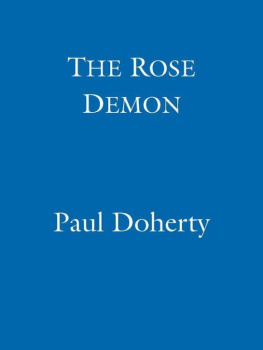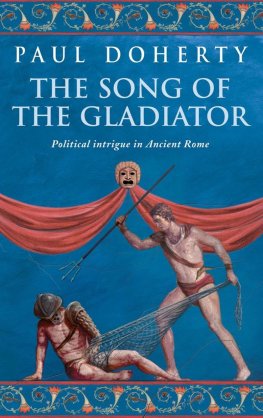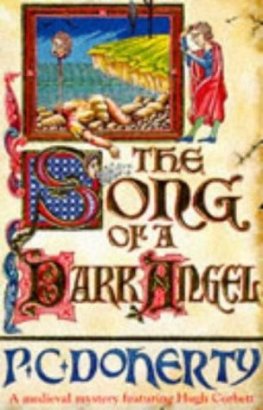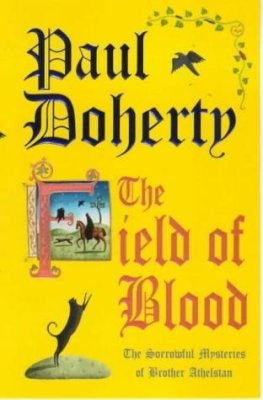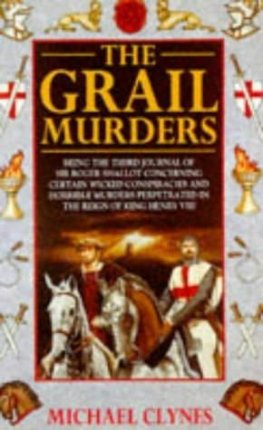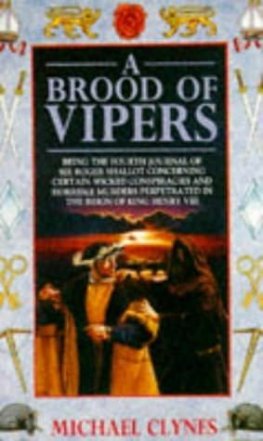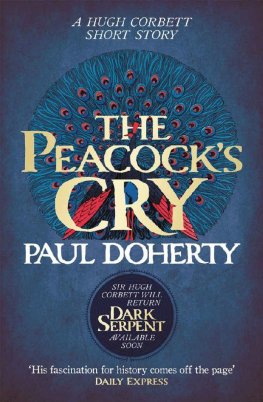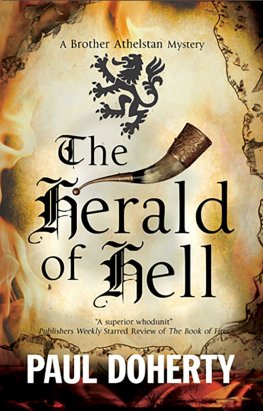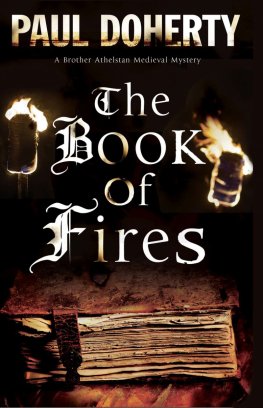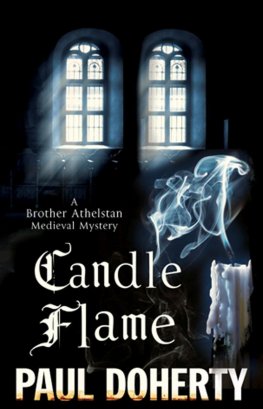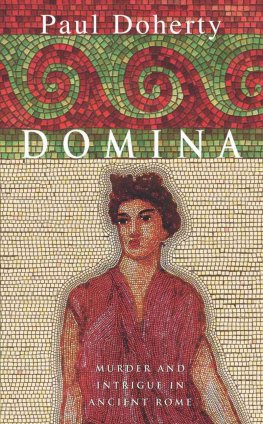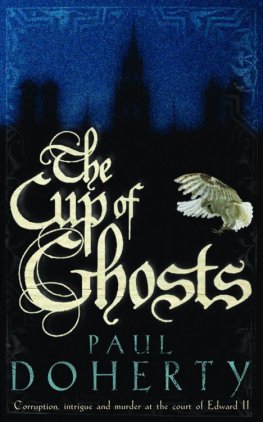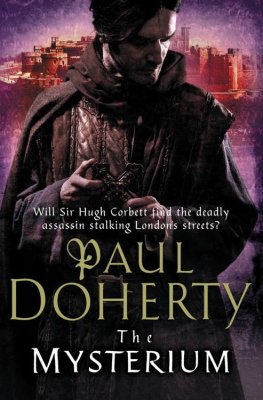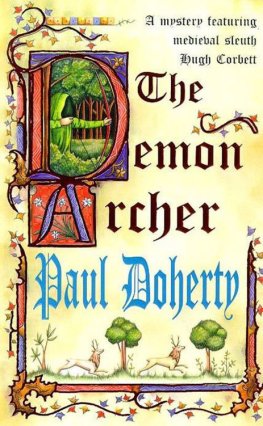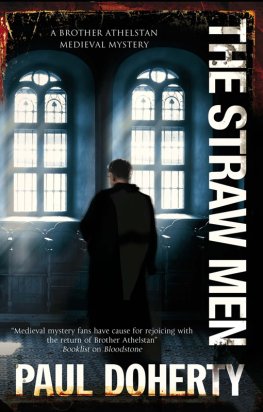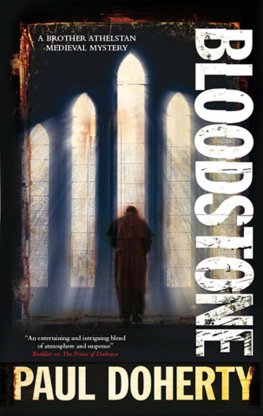THE ROSE DEMON
PAUL DOHERTY
headline
www.headline.co.uk
Copyright 1997 P.C. Doherty
The right of P.C. Doherty to be identified as the Author of the Work
has been asserted by him in accordance with the Copyright, Designs
and Patents Act 1988.
All rights reserved. No part of this publication may be
reproduced, stored in a retrieval system, or transmitted,
in any form or by any means without the prior written
permission of the publisher, nor be otherwise circulated
in any form of binding or cover other than that in which
it is published and without a similar condition being
imposed on the subsequent purchaser.
First published as an Ebook by Headline Publishing Group in 2008
All characters in this publication are fictitious
and any resemblance to real persons, living or dead,
is purely coincidental.
ISBN 978 0 7553 5046 9
This Ebook produced by Jouve Digitalisation des Informations
HEADLINE PUBLISHING GROUP
An Hachette Livre UK Company
338 Euston Road
London NW1 3BH
www.headline.co.uk
www.hachettelivre.co.uk
Table of Contents
P.C. Doherty was born in Middlesbrough. He studied History at Liverpool and Oxford Universities and obtained a doctorate at Oxford for his thesis on Edward II and Queen Isabella. He is now the Headmaster of a school in North-East London, and lives with his wife and family near Epping Forest.
P.C Dohertys Hugh Corbett medieval mysteries - SATAN IN ST MARYS, CROWN IN DARKNESS, SPY IN CHANCERY, THE ANGEL OF DEATH, THE PRINCE OF DARKNESS, MURDER WEARS A COWL, THE ASSASSIN IN THE GREENWOOD, THE SONG OF A DARK ANGEL, SATANS FIRE and THE DEVILS HUNT - are also available from Headline, as are his other novels of mystery and murder - AN ANCIENT EVIL, being the Knights Tale, A TAPESTRY OF MURDERS, being the Man of Laws Tale, A TOURNAMENT OF MURDERS, being the Franklins Tale, and GHOSTLY MURDERS, being the Priests Tale, all told during the evenings on a pilgrimage from London to Canterbury.
Acclaim for P.C. Dohertys medieval mysteries:
Medieval London comes vividly to life... Dohertys depictions of medieval characters and manners of thought, from the highest to the lowest, ringing true Publishers Weekly
I really like these medieval whodunnits Sarah Broadhurst, Bookseller
... this is one of those books you hate to put down Prima
A powerful compound of history and intrigue Redbridge Guardian .
Dedicated to the memory of
Colonel Gilland Wales Corbitt (U.S.A.F.) D.F.C.
HISTORICAL NOTE
In 1453 the great Byzantine civilisation was extinguished when the Ottoman Turks broke into Constantinople, killing the Emperor and bringing his empire and what land he ruled firmly under the control of the Ottoman Turks. Despite the help of Venice and the military religious orders such as the Knights Hospitallers, as well as the fighting skills of Western mercenaries, Constantinople ceased to be.
In England such a disaster made little impact as the country was divided between the Houses of York and Lancaster. A bitter civil war raged which, in 1471, culminated in the destruction of the Lancastrian cause, the death of their king, Henry VI, the exile of his queen, Margaret of Anjou, and the execution of most of the Lancastrian commanders. York remained in the ascendant until the Battle of Bosworth in 1485 when Henry Tudor defeated the Yorkist king Richard III. Henry VIIs victory, however, was not complete and, for years afterwards, his reign was plagued by a series of powerful Yorkist pretenders.
In Spain, Aragon and Castile were to be united by the marriage of Ferdinand and Isabella. The successful union of these kingdoms led to the implementation of a much-treasured dream: the removal of the Moors, the capture of their great city of Granada, and the emergence of a Catholic Spain.
In Italy, meanwhile, a Genoese explorer and map-maker, Christopher Columbus, dreamt of sailing across the great Western Ocean to find a safer and more direct route to the Indies...
THE PROLOGUES
Constantinople 29 May 1453
The Rosa Mundi,
Its heart is cankered.
Its petals drop like a fallen angel
From the fields of heaven.
Oh day of wrath,
Oh day of mourning!
See fulfilled the prophets warning.
Heaven and earth in ashes burning!
The opening lines of the Dies Irae echoed along the marble naves of the churches. The priests in their gorgeous vestments, shrouded by clouds of incense, lifted their hands and beseeched the Almighty to help against the tide of terror which had broached the massive walls, towers and fortifications of Constantinople. Mohammed II, self-styled Gods Vice-Regent on earth, had brought his fleet across the Golden Horn. Just after dawn, his yellow-coated janissaries had made their final assault. The walls had been breached, the last home of the Caesars was about to fall. Already the purple, imperial banners were retreating deep into the city as cries of desolation rang out along the streets and alleyways of the Emperors city. Soon, the horses of the conquerors would ride in triumph into the palaces of the Byzantine nobles.
The calamity had been foretold. Hideous portents had filled the skies. Satan, like some great bat, his shadowy wings extended, his talons like those of a huge eagle, had been seen hovering over the city. And had not demons appeared in the hippodrome, red-clawed hands turned up towards the sky, whilst sepulchral voices at midnight, sounding like hollow bells, prophesied horror upon horror: Constantinople was about to fall.
In his private chamber at the Blachernae Palace, only a short distance from the fighting, Constantine Palaeologus, the last Roman Emperor, was about to leave and die on the walls of his city. In the antechamber, his housecarls, their long, blond hair falling down to their waists, now rested against marble walls, loosening the straps from their chain mail byrnies. They sipped wine and knew they would not taste it again until they met in the kingdom of God. They too were to die. Each had taken the blood oath. They would fight until their master fell, and beyond. They would never bend the knee to the Ottoman Turk. They were impatient for death and whispered amongst themselves what could occupy their emperor at such a fatal hour. He was closeted behind the ivory-plated doors of his private chamber with the old priest Eutyches and the two Westerners, the Hospitaller knights, Raymond and Otto Grandison. The brothers had come from Rhodes to offer their swords in the Emperors last stand. The housecarls agreed that the Grandisons were sturdy fighters - unlike the Western mercenaries, who had fled through the night, seeking shelter and succour from the Venetian fleet waiting so helplessly beyond the harbour.
Inside his privy chamber, Emperor Constantine slouched in his purple, gold-embossed throne. He stared down at the two knights kneeling before him. Their hair was thick with grease, dark faces unshaven, their armour was blood-spattered, their leather leggings stained with sweat. They both leant on their great, two-handed swords whilst between them stood the venerable Eutyches, dressed gorgeously in the full pontifical robes of a Byzantine priest. A gold-encrusted cape hung about Eutyches thin, bent shoulders, clasped by a silver chain at the front. Beneath this, in his white gloved hands, he held a pyx bearing the Sacrament.
I am going to die, the Emperor declared, breaking from his reverie. Before noon I will be dead. I will die like a Roman general, my face to the enemy, my sword in my hands.

